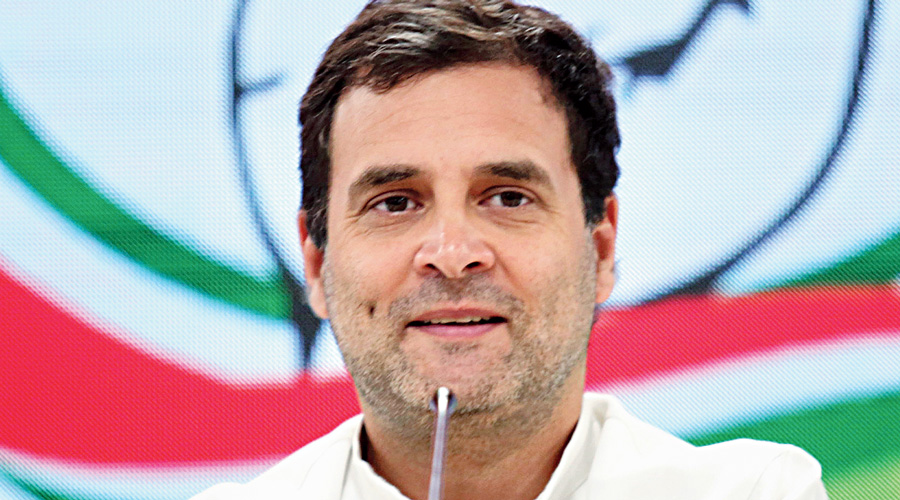The Congress on Tuesday accused the Narendra Modi government of abdicating its responsibility to ensure free vaccines to all, alleging the modified policy announced on Monday indicated the Centre had “passed the buck” to the cash-strapped states.
“Who will bear the cost of vaccination to citizens between 18 and 45? Has the Centre passed the buck to the states?” former finance minister P. Chidambaram said at a news conference, which he addressed jointly with fellow party seniors Jairam Ramesh and Ajay Maken.
The Congress has steadfastly been demanding free vaccination for every citizen although private hospitals have been allowed to sell the vaccine at Rs 250 a dose and millions have accepted that option.
Chidambaram said the government should have months ago worked out a comprehensive vaccination protocol and placed the necessary orders.
“The government did nothing for the last three-four months. They took their eye off the ball and started taking credit for defeating (the) corona(virus),” he said.
Rahul Gandhi, who tested Covid-positive on Tuesday, tweeted: “No free vaccines for 18-45 year olds. Middlemen brought in without price controls. No vaccine guarantee for weaker sections. Government of India’s Vaccine Discrimination-Not Distribution-Strategy!”
A statement issued by Chidambaram, Ramesh and Maken said: “Under the modified vaccine policy the Union government is running away from taking responsibility. (The modified policy) overburdens the states, encourages vaccine manufacturers to profiteer, and will worsen the inequality between states as well between poor and rich Indians.”
It added: “Nowhere in the world has any government left its vaccination programme to be determined by the vagaries of market forces, and for good reason.”
The statement, though, thanked the government for acknowledging the vaccine shortage and deficiencies in the current vaccination policy.
“(The) states will now bear the responsibility and cost of vaccinating the poorer sections who are below the age of 45 years and are neither health workers nor frontline workers, as defined by the central government,” it continued.
“The Centre appears to have abdicated its responsibility towards the poor by excluding them from the government’s vaccination programme. In a country where the median age is 28 years, to leave those who are below the age of 45 years out of a public-funded programme is, to say the least, callous.
“The migrant workers who live and work in other states and are the lifeblood of the economy of our cities will be the worst affected by this directive.
“By liberalising the pricing of vaccine, and by not fixing a price for states at the same rate as it is available to the Union government, the Centre is paving the way to unhealthy price bidding and profiteering.
“States with limited resources will be at a considerable disadvantage. States that are already weighed down by shrinking GST revenues, lower tax devolution, reduced grants-in-aid and increased borrowing would have to bear this additional burden. Meanwhile, nobody knows where the thousands of crores of rupees collected under PM-CARES are being deployed.”
Recalling that the government had advocated one-nation-one-election, Ramesh asked: “Why has it not ensured one price for the vaccine throughout the country? There will be one price for the Centre, one for the state, one for the private, one in the black market….”
Chidambaram said: “How will the price for the states be fixed? Will the two manufacturers (Serum Institute and Bharat Biotech) decide the price together? If yes, that will be an anti-competitive practice.”
The joint statement said the government had failed to grasp that the issue was not only one of production but also one of financing, procuring and distributing the vaccines, and of coordinating with the states.
“Ignoring the suggestion of Manmohan Singh in his letter to the Prime Minister, the modified vaccine policy does not provide funds for capital investment to the vaccine manufacturers to ramp up production. Furthermore, the modified policy does not invoke the provisions in law for compulsory licensing to allow other domestic vaccine manufacturers to manufacture the approved vaccines and augment total supply,” it said.
The Congress leaders underlined that there was no clarity whether any foreign manufacturer had agreed to export its vaccine to India and, if so, whether it had promised to supply adequate quantities according to an agreed schedule.
“It is also not clear if the central government will take the initiative to import foreign-made vaccines and distribute them among the states,” the statement said.










